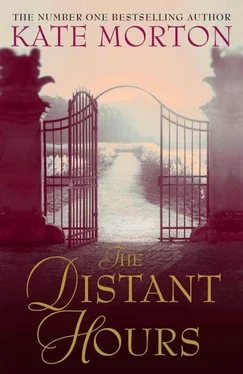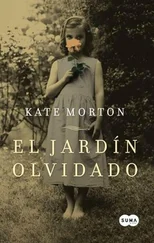‘No, Dad, Raymond Blythe just invented it.’
‘But it’s so vivid, Edie; I can see it in my head when you’re reading, as if I were watching it happen; as if I knew the story already.’ And he would shake his head with a wonder that made me warm to the tips of my toes with pride, even though I’d taken no part, myself, in the Mud Man’s creation. On days when I stayed late at work he became fidgety, grouching at Mum all evening, listening for my key in the door, then ringing his little bell and feigning surprise when I answered: ‘Is that you, Edie?’ he’d say, lifting his brows as if confused. ‘I was just going to ask your mother to plump my pillows. I say – seeing as you’re here, we might as well take a look at what’s happening at the castle.’
And perhaps it was the castle, even more than the story, that had really won him over. His jealous respect for grand family estates was as close as Dad came to having a general interest and once I let slip that Bealehurst was based heavily on Raymond Blythe’s real ancestral home, his interest was assured. He asked copious questions, some of which I could answer from memory or existing knowledge, others that were so specific I had no choice but to produce my copy of Raymond Blythe’s Milderhurst for him to pore over; sometimes even reference books I’d borrowed from Herbert’s enormous collection and brought home from work. Thus it was that Dad and I fanned each other’s infatuation and, for the first time ever, the pair of us found ourselves with something in common.
There was only one sticking point in our happy formation of the Burchill family Mud Man fan club, and that was Mum. No matter that our Milderhurst habit had arisen quite innocently, the fact that Dad and I were sitting together behind closed doors, bringing to life a world Mum resolutely refused to speak about, and over which she had greater claim than either of us, felt sneaky. I knew I was going to have to talk to her about it; I also knew the conversation was going to be prickly.
Since I’d moved back home, things between Mum and me had continued as they always had. Somewhat naively, I think I’d half expected that the two of us might undergo a miraculous renaissance of affection; that we might slip into a routine together, fall easily and often into conversation; that Mum might even bare her soul and divulge her secrets to me. I suppose that’s what I’d hoped might happen. Needless to say, it didn’t. In fact, although I think Mum was pleased to have me there, grateful that I was helping out with Dad and far more tolerant of our differences than she had been in the past, in other respects she seemed more distant than ever, distracted and vague and very, very quiet. I’d assumed, at first, that it was a result of Dad’s heart attack, that the worry followed hotly by relief had thrown her into a tumble of re-evaluation; but as the weeks went by and things didn’t improve, I began to wonder. I found her sometimes paused in the middle of an activity, standing with her hands in the sudsy kitchen sink, staring blankly through the window. And the expression on her face was so faraway, so knotted and confused, it was as if she’d forgotten where and who she was.
It was in just such inclination that I found her on the evening I came to fess up about the reading.
‘Mum?’ I said. She didn’t seem to hear and I went a little closer, stopping by the corner of the table. ‘Mum?’
She turned from the glass. ‘Oh, hello, Edie. It’s pretty this time of year, isn’t it. The long, late sunsets.’
I joined her by the window, watching the last glaze of peach darken from the sky. It was pretty, though perhaps not sufficiently to warrant the ardent attention she was paying it.
After a time, in which Mum said nothing further, I cleared my throat. I told her I’d been reading the Mud Man to Dad, then I very carefully explained the circumstances that had led to such a thing, in particular that it hadn’t been planned. She barely seemed to hear me, a slight nod when I mentioned Dad’s fascination with the castle the only sign that she was listening. When I’d reported everything I considered of consequence, I stopped and waited, steeled myself a little for whatever might be coming.
‘It’s kind of you to read to your dad, Edie. He’s enjoying it.’ It was not exactly the response I’d expected. ‘That book is becoming something of a tradition in our family.’ The flicker of a smile. ‘A companion in times of ill health. You probably don’t remember. I gave it to you when you were home with mumps. You were so miserable, it was all I could think to do.’
So. It had been Mum all along. She, and not Miss Perry, had chosen the Mud Man . The perfect book, the perfect time. I found my voice. ‘I remember.’
‘It’s good that your father has something to think about while he’s lying in bed. Better still that he has you to share it with. He hasn’t had many visitors, you know. Other people lead busy lives, the fellows from his work. Most of them sent cards, and I suppose since he retired… well, time marches on, doesn’t it? It just… it isn’t easy for a person to feel they’ve been forgotten.’
She turned her face away then, but not before I’d noticed her lips pressed hard together. I had a feeling we were no longer speaking only of my dad, and because all roads of thought led me at that time to Milderhurst, to Juniper Blythe and Thomas Cavill, I couldn’t help wondering whether Mum was mourning an old love affair; a relationship from long before she met my dad, when she was young and impressionable and easily wounded. The more I pondered it, the longer I stood there stealing glances at her pensive profile, the angrier I felt. Who was this Thomas Cavill who had skipped off during the war, leaving a spill of broken hearts behind him. Poor Juniper, wasting away in her family’s crumbly castle, and my own mother, nursing her private sorrow decades after the fact.
‘There’s one thing, Edie – ’ Mum was back to facing me now, her sad eyes searching mine – ‘I’d rather your father didn’t know about my evacuation.’
‘Dad doesn’t know you were evacuated?’
‘He knows that it happened, but not where I went. He doesn’t know about Milderhurst.’
She suddenly paid great attention to the back of her hands, lifting each finger in turn, adjusting her fine gold wedding band.
‘You do realize,’ I said gently, ‘that he’d think you a person of inestimable fabulousness if he knew you’d lived there once?’
A slight smile ruffled her composure, but her attention didn’t leave her hands.
‘I’m serious. He’s smitten with the place.’
‘Nevertheless,’ she said, ‘I’d prefer it this way.’
‘OK. I understand.’ I didn’t, but I think we’ve established that already, and the way the streetlight was now caressing her cheekbones made her look vulnerable, like a different kind of woman, younger and more breakable somehow, so I didn’t press further. I continued to watch her, though; her attitude was one of such keen contemplation that I couldn’t look away.
‘You know, Edie,’ she said softly, ‘when I was a girl my mother used to send me out around this time of night to fetch your grandfather back from the pub.’
‘Really? By yourself?’
‘It wasn’t uncommon back then, before the war. I’d go and wait by the door of the local and he’d see me and wave and finish his drink and then we’d walk home together.’
‘The two of you were close?’
She tilted her head a little. ‘I perplexed him, I think. Your grandmother, too. Did I ever tell you that she wanted me to become a hairdresser when I left school?’
‘Like Rita.’
She blinked at the night-black street outside. ‘I don’t think I’d have been much good at it.’
Читать дальше












